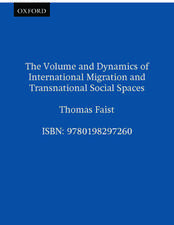Translingual Practices and Neoliberal Policies: Attitudes and Strategies of African Skilled Migrants in Anglophone Workplaces: SpringerBriefs in Linguistics
Autor Suresh Canagarajahen Limba Engleză Paperback – 8 aug 2016
This book responds to recent criticisms that the research and theorization of multilingualism on the part of applied linguists are in collusion with neoliberal policies and economic interests. While acknowledging that neoliberal agencies can appropriate diverse languages and language practices, including resources and dispositions theorized by scholars of multilingualism, it argues that a distinction must be made between the different language ideologies informing communicative practices. Those of neoliberal agencies are motivated by distinct ideological orientations that diverge from the theorization of multilingual practices by critical applied linguists.
In addressing this issue, the book draws on the author’s empirical research on skilled migration to demonstrate how sub-Saharan African professionals in English-dominant workplaces in the UK, USA, Australia, and South Africa resist the neoliberal communicative expectations and employ alternate practices informed by critical dispositions. These practices have the potential to transform neoliberal orientations on material development. The book labels the latter as informed by a postcolonial language ideology, to distinguish them from those of neoliberalism. While neoliberal agencies approach languages as being instrumental for profit-making purposes, the author’s informants focus on the synergy between languages to generate new meanings and norms, which are strategically negotiated in pursuit of ethical interests, inclusive interactions, and holistic ecological development. As such, the book clearly illustrates that the way critical scholars and multilinguals relate to language diversity is different from the way neoliberal policies and agencies use multilingualism for their own purposes.
Din seria SpringerBriefs in Linguistics
-
 Preț: 377.73 lei
Preț: 377.73 lei -
 Preț: 378.92 lei
Preț: 378.92 lei - 15%
 Preț: 461.54 lei
Preț: 461.54 lei -
 Preț: 377.35 lei
Preț: 377.35 lei -
 Preț: 476.95 lei
Preț: 476.95 lei -
 Preț: 378.71 lei
Preț: 378.71 lei -
 Preț: 476.21 lei
Preț: 476.21 lei -
 Preț: 378.92 lei
Preț: 378.92 lei -
 Preț: 378.92 lei
Preț: 378.92 lei -
 Preț: 378.54 lei
Preț: 378.54 lei -
 Preț: 448.59 lei
Preț: 448.59 lei -
 Preț: 412.30 lei
Preț: 412.30 lei -
 Preț: 379.86 lei
Preț: 379.86 lei -
 Preț: 410.01 lei
Preț: 410.01 lei -
 Preț: 376.80 lei
Preț: 376.80 lei
Preț: 441.85 lei
Nou
Puncte Express: 663
Preț estimativ în valută:
84.55€ • 92.21$ • 71.29£
84.55€ • 92.21$ • 71.29£
Carte tipărită la comandă
Livrare economică 24 aprilie-08 mai
Preluare comenzi: 021 569.72.76
Specificații
ISBN-13: 9783319412429
ISBN-10: 3319412426
Pagini: 71
Ilustrații: VII, 66 p.
Dimensiuni: 155 x 235 x 4 mm
Greutate: 0.12 kg
Ediția:1st ed. 2017
Editura: Springer International Publishing
Colecția Springer
Seria SpringerBriefs in Linguistics
Locul publicării:Cham, Switzerland
ISBN-10: 3319412426
Pagini: 71
Ilustrații: VII, 66 p.
Dimensiuni: 155 x 235 x 4 mm
Greutate: 0.12 kg
Ediția:1st ed. 2017
Editura: Springer International Publishing
Colecția Springer
Seria SpringerBriefs in Linguistics
Locul publicării:Cham, Switzerland
Cuprins
Introduction.- Critical discussion.- Neoliberal orientation to language.- Comparing neoliberalism with translingual practice.- Language policy and practice in skilled migration.- Pedagogical implications.
Textul de pe ultima copertă
This book responds to recent criticisms that the research and theorization of multilingualism on the part of applied linguists are in collusion with neoliberal policies and economic interests. While acknowledging that neoliberal agencies can appropriate diverse languages and language practices, including resources and dispositions theorized by scholars of multilingualism, it argues that a distinction must be made between the different language ideologies informing communicative practices. Those of neoliberal agencies are motivated by distinct ideological orientations that diverge from the theorization of multilingual practices by critical applied linguists.
In addressing this issue, the book draws on the author’s empirical research on skilled migration to demonstrate how sub-Saharan African professionals in English-dominant workplaces in the UK, USA, Australia, and South Africa resist the neoliberal communicative expectations and employ alternate practices informed by critical dispositions. These practices have the potential to transform neoliberal orientations on material development. The book labels the latter as informed by a postcolonial language ideology, to distinguish them from those of neoliberalism. While neoliberal agencies approach languages as being instrumental for profit-making purposes, the author’s informants focus on the synergy between languages to generate new meanings and norms, which are strategically negotiated in pursuit of ethical interests, inclusive interactions, and holistic ecological development. As such, the book clearly illustrates that the way critical scholars and multilinguals relate to language diversity is different from the way neoliberal policies and agencies use multilingualism for their own purposes.
Caracteristici
Offers insights on applied linguistic research into multilingualism and how this differs from the neoliberal approach Draws on empirical research on how sub-Saharan African migrant professionals introduce translingual practices at their workplaces Discusses how teachers can cultivate effective intercultural relations and communicative practices Includes supplementary material: sn.pub/extras










